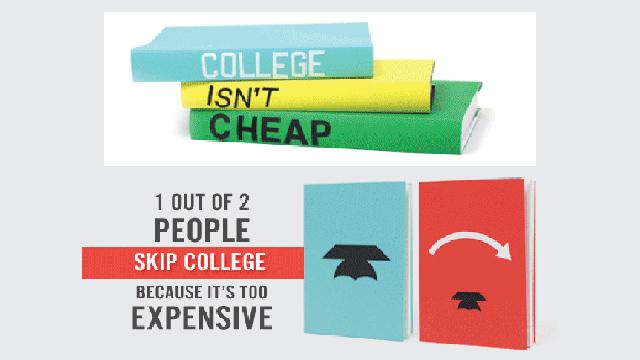
There are dozens of benefits that justify earning a higher education, including – but by no means limited to – better employment prospects, access to jobs with higher pay and the broadening of a college student’s social and mental horizons.
Even so, approximately one in two high school graduates choose to forgo these potential benefits because they cannot reconcile the cost of the college experience with the bleak reality of the financial situation in which many new college grads find themselves.
There’s no denying that college is outrageously expensive. And, unfortunately, it is only getting worse; while the average family income in the United States grew 147% in the years between 1982 and 2007, the cost of college grew by a staggering 440% in that same period.
What that means in terms of real numbers is that the average cost of a four-year degree from a state school is now $30,000. Most American families do not have that kind of money up front, which necessitates that they borrow it from private or government programs that issue student loans.
Unfortunately, student loans leave college graduates an average of $20,000 in debt when they finish school. And approximately 10% of graduates will have twice that debt to repay. Collectively, American students owe more than $1 trillion.
Figures like these, in combination with the fact that only half of all college graduate obtained a full-time job in 2011, are why more than 6 million graduates cannot pay back their student loans. The economic recession that began in 2008 has made it exceptionally difficult for college graduates to find jobs in their field. The upshot is that students take on lower-paying jobs that do not require degrees in order to make ends meet. Even so, that limited income is, in many cases, not enough to pay back their debt.
One in six default on their loans and a whopping 85% of 2011 college graduates were forced to move back in with their parents after school because they could not afford their own living space. To keep your children from contributing to that statistic, there are several ways to start saving well ahead of the day they move into the dorms:
• Start when your kids are young
• Contribute regularly to a savings account
• Invest wisely in equities
• Take advantage of 529 College Savings Plans
• Utilize tax credits for parents of college students
Of course, parents do not have to shoulder the entire responsibility of their children’s education. There are many ways for students to help pay for their own education, including earning scholarships, applying to federal student aid programs and participating in work study opportunities.
To make sure teenagers are contributing to their college funds, parents can encourage them to grow their own income by saving money from a part-time job. Remember, saving just $20 per week by making small sacrifices leads to $1,000 in savings over a year. And with college tuition rates steadily increasing, every dollar counts.
3 WAYS TO SHOW YOUR SUPPORT
- Log in to post comments











